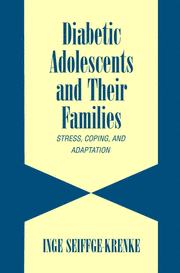Book contents
- Frontmatter
- Contents
- Foreword by Stuart T. Hauser
- Preface
- 1 Epidemiology of Chronic Illnesses in Adolescence
- 2 Coping with Illness in Adolescence: An Overview of Research from the Past 25 Years
- 3 Coping with Diabetes: A Longitudinal Study
- 4 Knowledge of the Illness, Compliance, and Patient–Physician Relationships
- 5 Self-Concept, Body Image, and Perceived Health
- 6 Adolescent, Parental, and Family Coping with Stressors
- 7 Chronic Illness and the Family: The Perspectives of Mothers, Fathers, and Siblings
- 8 Friendships, Romantic Relationships, School, and Career
- 9 Successful Adaptation or the Development of Psychopathology?
- 10 Pathways for Resolving the Dilemma between Developmental Progression and Adaptation to the Illness
- 11 Implications for Prevention and Intervention
- References
- Index
2 - Coping with Illness in Adolescence: An Overview of Research from the Past 25 Years
Published online by Cambridge University Press: 06 August 2009
- Frontmatter
- Contents
- Foreword by Stuart T. Hauser
- Preface
- 1 Epidemiology of Chronic Illnesses in Adolescence
- 2 Coping with Illness in Adolescence: An Overview of Research from the Past 25 Years
- 3 Coping with Diabetes: A Longitudinal Study
- 4 Knowledge of the Illness, Compliance, and Patient–Physician Relationships
- 5 Self-Concept, Body Image, and Perceived Health
- 6 Adolescent, Parental, and Family Coping with Stressors
- 7 Chronic Illness and the Family: The Perspectives of Mothers, Fathers, and Siblings
- 8 Friendships, Romantic Relationships, School, and Career
- 9 Successful Adaptation or the Development of Psychopathology?
- 10 Pathways for Resolving the Dilemma between Developmental Progression and Adaptation to the Illness
- 11 Implications for Prevention and Intervention
- References
- Index
Summary
As mentioned in chapter 1, adolescents assume a middle position in morbidity rates in comparison with other age groups. Problems with health and illness rarely crop up in adolescents' spontaneous remarks, although – or perhaps precisely because – adolescents are so concerned with their physical development and want to be “as normal as possible”. One should not forget, of course, that at least 10% of all families in Germany care for a chronically ill adolescent (Seiffge-Krenke, 1998a); comparable surveys in the United States and Great Britain have documented rates of 7 to 12% (Eiser, 1992; Gortmaker et al., 1990). Thus, chronic illness in adolescence is not a rare occurrence. In this chapter, research on adolescent coping withchronic illness will be reviewed. Thereby it will become evident that interest is growing in understanding the psychological processes and outcomes that are linked with chronic illness in this particular age group.
Current State of Research: Results of Two Meta-analyses
This chapter provides a brief overview of the current state of research on adolescents' coping with chronic illness, based on two meta-analyses. In the first meta-analysis, the period from 1970 to 1988 was studied. A literature search of the databases Psychinfo and Psyndex retrieved 249 publications on the topic of coping with illness in adolescence (for a summary, see Seiffge-Krenke & Brath, 1990).
- Type
- Chapter
- Information
- Diabetic Adolescents and their FamiliesStress, Coping, and Adaptation, pp. 9 - 24Publisher: Cambridge University PressPrint publication year: 2001



